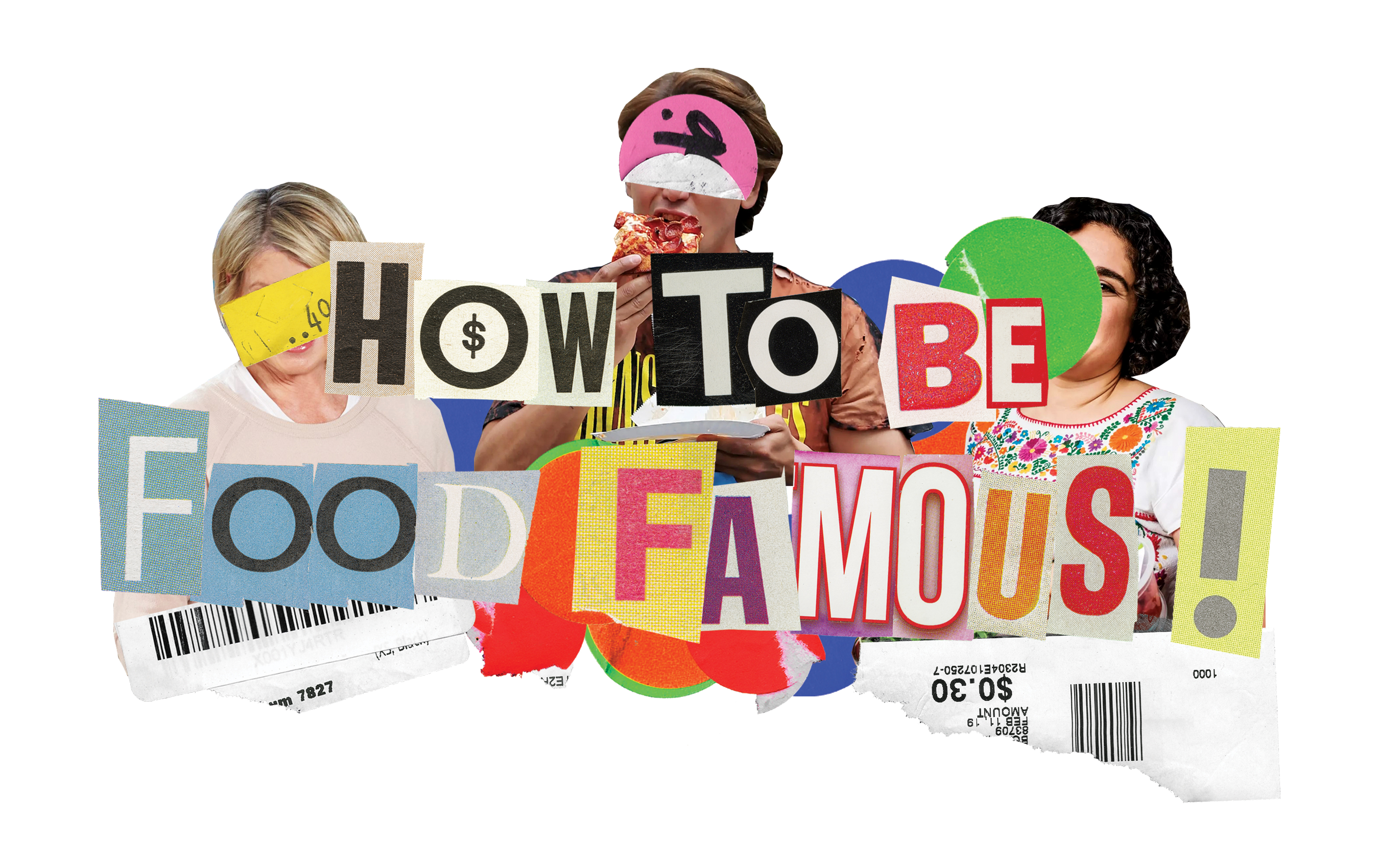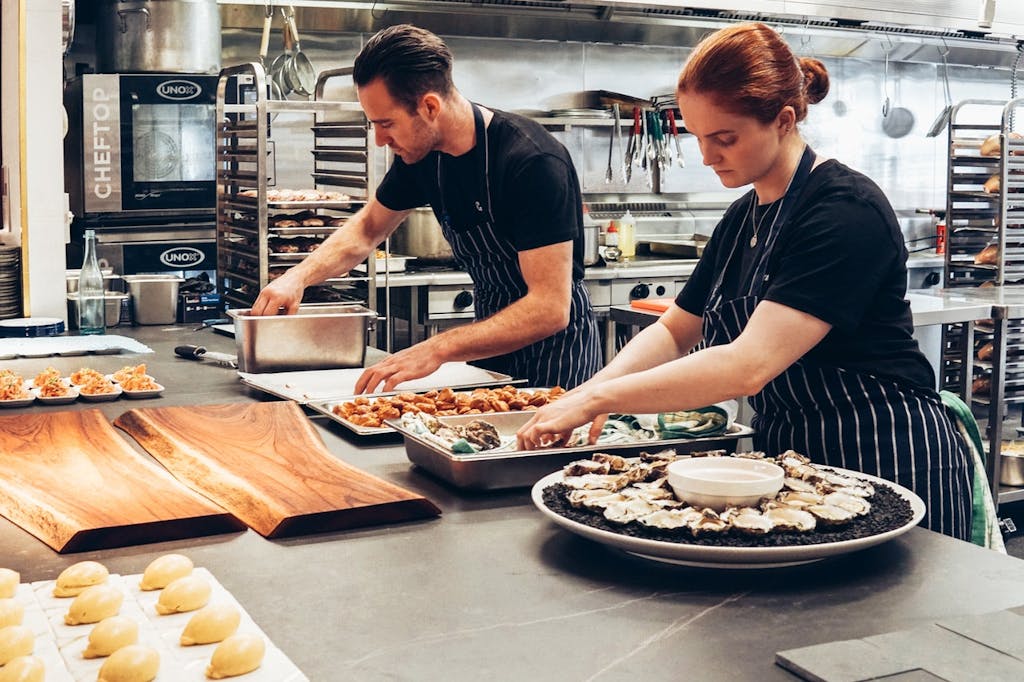[ad_1]

Brooklyn native Nasim Lahbichi always enjoyed sharing his recipes with friends on Instagram, but it wasn’t until the COVID-19 pandemic began in the spring of 2020 that he thought to turn it into a career. Newly graduated from Manhattan’s Fashion Institute of Technology and with no job prospects in sight, Lahbichi started posting his cooking content to TikTok — because why not? He didn’t have anything else going on, and it was one way to interact with people without risking anyone’s health.
Two years later, Lahbichi has 268,000 Instagram followers and 493,000 followers on TikTok. He publishes approximately two recipes each week inspired by everything from his heritage (his father is from Morocco and his mother is Puerto Rican) to astrology (his sun sign: Virgo) to the new season of Bridgerton. He’s partnered with brands including Urban Outfitters and the TikTok platform, and he’s now making a living as a content creator.
Lahbichi sat down with Eater to share his insights on becoming TikTok famous, the importance of community, and what he wishes people knew about his nontraditional career.
I always considered myself a creative, and I am so humbled to have the chance to use visuals and good food to help those who don’t have the physical access to these cultures open their minds and hearts through sustenance.
In October 2020, Thrive Market reached out to me about doing an ad, and that’s when I realized I could start making a living doing this. I eventually worked with TikTok on a campaign called “Learn on TikTok.” They were reaching out to creators who were teaching others how to dance or how to cook or doing arts and crafts. Realizing that what I’m producing is worthy of compensation was a turning point. Educating people is still my main goal, but making a living off it allows me to do more. It also took away the stress of looking for a job: I can make a living off my creations and be able to put more effort and love into it.
Unfortunately, there are plenty of brands that think creators should do this work for free. This is an issue in the industry — brands will reach out assuming exposure or free product is worthy payment for a video that takes me an entire week to create, not to mention that I’m paying for the film equipment and the lighting. Utility bills can’t be paid for in free protein bars. I don’t even bother responding to those requests because it’s disrespectful to a creator who puts so much time and effort and mental energy into their work.
I will say, though, I basically worked for free for six to eight months before I started making money from it. My friend Justine [@Justine_Snacks on TikTok] and I talk about this a lot. We’re both very transparent about what we’re being paid, so that way brands can’t take as much advantage of other creators. There’s such a discrepancy between how much certain operators are being paid.
I personally don’t like to be called an influencer because I think there’s a negative connotation with that category of creators. When I think “influencer,” I think of YouTubers who care more about followership, analytics, and sponsorships. There’s a lack of empathy associated with many influencers. I call myself a content creator because, at the end of the day, I am a creator. I like to think that I build community and create a space for people to learn. Outside of cooking, I’ve been playing with makeup a lot more in my day-to-day life while sharing glimpses of it in my videos; I had a mother tell me that her young son started wearing nail polish because he liked mine. It’s really cool to inspire others to be their truest authentic self. At the end of the day, I do influence other people in terms of food, to nourish their mind, body, and soul.
There’s still a negative stigma with this work. People think that being a creator, or an influencer, is an easy job. Yes, it’s not as physically taxing as some other jobs. (I did a pop-up at a restaurant recently, and I gained even more respect for people in the service industry. The aches in my body the next day were insane.) But this job impacts creators like myself in other ways that can be taxing, mentally and emotionally.
A typical week for me includes lots of filming, recipe development, meetings, and moderating comments and engaging with the community. I test my recipes nonstop. I’ve been working on a chocolate cake recipe. I made seven chocolate cakes last week, five of them in two days. It’s super frustrating to have seven cakes not work out and know that I have to do this for an ad that has a certain deadline. I will usually film four hours, three or four days of the week. A lot of people don’t understand that online creators are on 24/7. There’s never a time when I’m not thinking about work. My roommates have corporate jobs where, once they close the laptop, they’re done for the day. I’m writing a recipe at 11 p.m. or writing a blog post at midnight just so that it can go up in time the next day. Then there’s interacting with the community, which I’m so grateful for, but it can be emotionally taxing.
There are people who send the most beautiful, admirable messages. And there are people who open up and are so emotionally vulnerable with you. I understand why they reach out to me. I like to think I create a safe space for people, but also sometimes I don’t have the capacity for it. It’s a lot, and it hurts me to have to shut them down or tell them, “I’m sorry, I can’t handle this right now.” Setting up boundaries can be really challenging in this industry. I’ve been trying to set aside more time for myself.
What’s crazy about social media is how many people don’t understand that I’m still a person with feelings, and I have to deal with a lot of personal issues on top of whatever they’re projecting on me. Projection is the main source of so much hate. People will project their insecurities, their own self-hate, their own lack of self-worth onto me and others. It’s not kind, and it’s definitely not warranted.
I went through a rough time recently with an important relationship ending, and it’s put me in this weird space; I’ve always been deemed as this positive light in many people’s lives online, but I’m also deeply sad right now. I don’t know if I should be sad online. I was open in my content about going through a rough time, but I made a point to do this thing where I would say “good morning” and “goodnight” every day, saying it to my online community in place of the person who was no longer a part of my life. There are folks who messaged me, saying, “I don’t have anyone who tells me good morning or goodnight, and it really makes my day to have you say that to me and it truly does make my day better.”
I’ve also accepted that I can’t be my best self when I’m tired or when I’m not respected or not respecting myself by overworking. Burnout is really easy because you’re constantly feeling the need to reinvent yourself. That’s something that I’m constantly trying to figure out. What do I share? Should I share this part of myself? When is it appropriate to share my thoughts, for example, with all of the major geopolitical events happening around the world right now?
There are people who expect me to talk about things that I have no expertise on, that I don’t know about. I understand that they see me as a platform and a voice that has influence. But I also don’t want to share false information. I don’t want to say the wrong thing, and it’s so easy to do so if you don’t understand what you’re talking about.
I want the creator space to move away from the selective and limited information that social media provides. One of my mentors, Sophia Roe, has talked about this before: If you think I’m not doing enough, that means you have to do more. I really wish that there’d be more empathy and less of an expectation that everyone has to be perfect. That the people that you look up to can’t make mistakes. I can teach you how to make a cake or how to whip up a tagine, but I don’t know everything about Ukrainian-Russian politics or everything else going on in the world. It’s very interesting being pigeonholed into spaces where you never asked to be put in the first place.
Two areas where I’m very passionate are supporting the LGBTQIA+ community and supporting the efforts for food sovereignty and food equity. I want to do as much as I can to help communities in need, who don’t have access to food. So something that I’ve been incorporating into every single brand partnership is including a giveback component that allows the brand to donate alongside me to an organization or group that we both align on. Recently, I learned that a brand I work with regularly has decided to add my donation structure into their influencer program. So from now on, they’ll donate to an organization on behalf of everyone they work with. That was really beautiful to hear.
In terms of future goals for my career, I have a couple in mind. I don’t believe that social media is sustainable as my only outlet for the long run. I don’t want to deal with the lack of creative freedom or the pressure to make certain content garner a lot of attention just because it’s a partnership. I’ve made it a point to make advocacy work a part of many future initiatives, giving back to organizations I support and admire. As COVID regulations ease a bit, I hope to help bring people together around food, culture, and community.
At the moment, I’m collaborating with a friend on an event series that lets us bring people together in order to spark conversation and create a space where people of all backgrounds are welcome and validated. A goal of mine is to eventually return to my roots in design and start a company focused on the hospitality industry. I want to curate and create spaces for queer people of color, by queer people of color. There are not enough queer spaces and spaces for pride of all backgrounds to flourish, which is why these environments must be accessible.
I constantly give credit to my parents for raising me with humbleness, that everyone is worthy of time and space. It makes me wonder how much more peace we would have if everyone were happier, able to be themselves completely, able to live life however they want, without the fear of being torn down by the systems that make it harder to just get by day to day. I only hope that folks will embrace more compassion, empathy, and solidarity both online and offline in the future because it is imperative for a more just world.
Nasim Lahbichi is a cook and content creator born and raised in Brooklyn, NY. His goal is to help curate spaces where folks can gain a sense of power in the kitchen, and at the table, to feel at home and safe.
Marylu E. Herrera is a Chicago-based artist with a focus on print media and collage.
Copy edited by Leilah Bernstein
[ad_2]
Source link

:max_bytes(150000):strip_icc()/types-of-engagement-ring-settings-guide-2000-86f5b8f74d55494fa0eb043dee0de96e.jpg)

More Stories
eggplant involtini – smitten kitchen
Pineapple Coconut Crescents – Jo Cooks
The Ultimate List of Christmas Baking Ideas